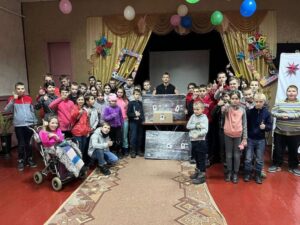
The “Hope and Unity” Charitable Foundation continues to actively support the Ohmatdyt Children’s Hospital. Thanks to caring Ukrainians and the support of the Foundation’s partners, we have managed to raise significant funds for the purchase of necessary equipment, medicines and materials.
This week, a modern lung ventilator was delivered to the hospital, which will help save the lives of the youngest patients. In addition, the foundation provided the oncology department with new beds and medical instruments. A recreation room with games and educational materials was organized for children undergoing long-term treatment.
“We understand how important the atmosphere in which children are treated is for them,” says PIB, founder of the ‘Hope and Unity’ Foundation. – “That is why we strive to create the most comfortable conditions for young patients and their parents at Okhmatdyt.
The “Hope and Unity” Foundation calls on all those who care to join the charitable cause and support the Okhmatdyt Children’s Hospital. Every hryvnia, every little thing matters and can save a child’s life.
How to help:
Together we can create a future for every child!
CHARITY, CHILDREN, DISEASE, foundation, HELP, Hope and Unity, SUPPORT, ОХМАТДИТ
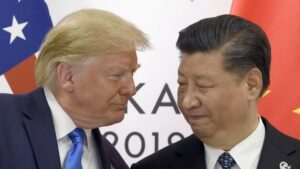
US President Donald Trump said that he has “always liked” Chinese President Xi Jinping and expressed hope for China’s help in a peaceful resolution of Russia’s war against Ukraine.
“I hope China will help us stop the war, particularly with Russia, Ukraine, and they have a lot of power over this situation. And we will work with them. And I mentioned that during our phone call with President Xi, and I hope we can work together and stop it,” he said during an online chat after a special address at the World Economic Forum in Davos on Thursday.
According to Trump, his administration “looks forward to getting along very well with China.”
The US leader also noted that he “really likes President Xi” Jinping. “I’ve always liked him. We’ve always had a very good relationship,” the US president added.
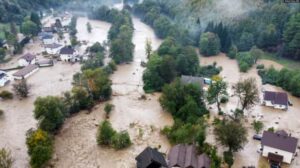
The death toll from the devastating floods in Bosnia and Herzegovina, which are being called the worst in decades, has already reached 19. On the morning of October 4, it was reported that heavy rains in Bosnia on Friday night had flooded several cities in the central and southern parts of the country.
After 16 people died in the municipality of Jablunice, rescuers also found the bodies of three people in the city of Fojnice, where the bad weather destroyed many houses and outbuildings.
Against this backdrop, Serbian President Aleksandar Vucic and Croatian Prime Minister Andrej Plenkovic agreed to provide all necessary assistance to Bosnia and Herzegovina.
Vucic previously noted that Serbia could send rescue helicopters and boats, as well as provide financial assistance.
And the Croatian prime minister said that his government is in constant contact with the head of the Council of Ministers of Bosnia and Herzegovina, Borjana Krishto, and is ready to provide “all the necessary assistance in eliminating the consequences of the flood.”
The EU High Representative for Foreign Affairs and Security Policy, Josep Borrell, also confirmed the readiness to help. He noted that Bosnia could benefit from the EU’s Civil Protection Mechanism, which it joined in 2022.

France and Canada have agreed to strengthen cooperation in the field of military materiel for Ukraine and in the field of training within the framework of the Defense Contact Group (Ramstein), in particular, they will continue to deepen strategic cooperation in the field of cyber defense in support of Ukraine, according to a declaration agreed upon during a meeting in Ottawa on September 26 by Canadian Prime Minister Justin Trudeau and French President Emmanuel Macron.
“We are committed to working with Ukraine and our partners to enable Ukraine to defend its sovereignty, independence and territorial integrity in the face of Russian aggression, both in traditional domains and in cyberspace, including by supporting the strengthening of Ukraine’s civilian cybersecurity capacity through the Tallinn Mechanism. More broadly, we will continue to discuss topics of mutual interest that were discussed during the Paris Conference on February 26, 2024,” the document, published on the Canadian government’s website, reads.
The declaration states that Canada and France have already trained tens of thousands of Ukrainian soldiers as part of Operation UNIFIER for Canada and the EU Military Assistance Mission in Support of Ukraine (EUMAM Ukraine) for France. The armed forces of the two countries also continued to cooperate in training Ukrainian fighter pilots.
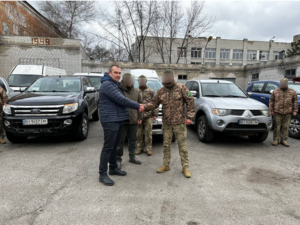
Since the beginning of the full-scale invasion, the Research and Production Enterprise ENERGO-PLUS has been involved in humanitarian initiatives and has been helping the Ukrainian military. The Kremenchuk energy company provides military units with vehicles, necessary equipment and machinery. The total amount of assistance since the beginning of the full-scale invasion is more than UAH 8 million.
The funds were used to purchase VOLKSWAGEN TRANSPORTER T5 and Mercedes-Benz VITO vans, as well as Renault Duster, NISSAN NAVARA, MITSUBISHI L200 cars and SUVs and three FORD RANGER vehicles. We also spend money on fuel and lubricants, as well as maintenance and repair of vehicles.
Another area of the company’s charitable activities is providing the military with equipment, tools, office equipment, etc. A separate part of the initiative is the purchase and delivery of 5 generators, which are an important element for power supply at the front line.
– Today, each of us must bring our country closer to victory. Ukrainian soldiers risk their lives every day for the sake of Ukraine’s independence, and we, joining our efforts, are obliged to help them,” emphasizes Yevgeniy Korf, Director of RPE ENERGO-PLUS LLC.
“The humanitarian direction is no less important, because at the beginning of the invasion, thousands of people needed shelter. Therefore, the company also joined the initiative of the Trust and Assistance Charitable Foundation to build a shelter for temporarily displaced persons.
The company’s core business is the design, development, and implementation of industrial automation, power supply, and various electrical systems for Ukrainian enterprises and private companies.
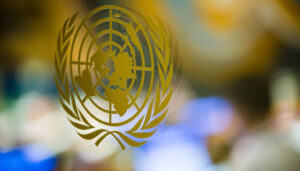
About $435 million is needed to help civilians across Ukraine by March 2024, according to the website of the UN Office for the Coordination of Humanitarian Affairs.
“The United Nations and partners are calling for about $435 million to be allocated for winter assistance. US dollars to provide winter assistance to more than 1.7 million people across Ukraine by March 2024,” the statement emphasizes.
It is noted that this year alone, the UN and partners have delivered 14 convoys to the frontline areas of Zaporizhzhia region, providing the necessary assistance to more than 30 thousand people living near the southern front. Since the beginning of the year, 96 humanitarian convoys have been delivered to the frontline areas.
In particular, as reported on November 3, an interagency humanitarian convoy delivered vital supplies for 1,600 people who remain in the frontline town of Orikhiv, Zaporizhzhia Oblast. The aid included medicines, household items, hygiene kits, blankets, mattresses, solar lamps and sleeping bags.